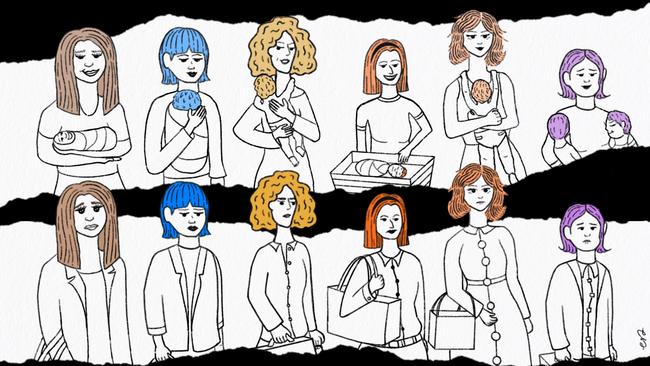
A 10-Year Plan to Unleash the Full Capacity and Contribution of Women to the Australian Economy, proclaims the title of the report released last month by the taskforce led by Sam Mostyn. The plan is simple – for women like me to get back to work.
Anyone who characterises unpaid caregivers as an idle part of the population who require “unleashing” has no concept of what care work actually entails or places no value on it. The taskforce cannot “unleash” me because I have nothing more to give – I’m already engaged in the full-time work of caring for children. I’m not an untapped resource reclining on a lounge. Entering paid work at this point would merely be exchanging one form of legitimate work for another. Paying someone else a small fortune to raise my children in less than ideal conditions while I do a job the taskforce deems a worthy “contribution”, does not sound like progress to me.

This sounds like elite career feminists prescribing what is “best” for women and engaging in policy architecture that exclusively supports women who make the same choices they did.
The WEET report repeatedly frames unpaid carers as an opportunity cost in the order of $128bn.
The authors implore us to imagine how much money we could all make if no parents were engaged in the care of their own children during business hours beyond paid parental leave. I should add here that the report does recommend extending paid parental leave to 52 weeks and for superannuation to be paid while on leave.
But beyond the child’s first birthday the implication is that a parent who remains in an unpaid caregiving role is a dead weight in the economy – a problem to be solved. This theme surfaces again and again. How we could watch the billions roll in if only all the women like me turned around tomorrow and put our kids in daycare.
The vast majority of recommendations in this report relate to improving childcare and a woman’s ability to return to paid work, but the taskforce largely overlooks a crucial pillar in achieving gender equality – improving conditions for women in their unpaid care contributions. If the taskforce accepts that care work is a necessary role in society, it undermines its own ultimate goal by not making recommendations that support that work. It wants gender equality but only on its terms.
Beyond paid parental leave there are no recommendations that provide support in real time for people engaging in unpaid care work. The taskforce recommends pausing indexation on HECS debts for unpaid carers and a tax offset on their return to paid work, but these don’t actively support someone in their years outside of paid work.
This is cold comfort for single-income families struggling to make ends meet and it’s not going to help primary carers who are feeling undervalued and isolated in their day-to-day work.
Even the recommendations that seek to address the motherhood penalty manage to withhold support until such a time as a mother returns to paid work. They dangle carrots and dollar signs to incentivise women to disengage from caregiving.
Instead of imploring women to do different work, why don’t we better support the work women already do? A universal parenting payment that a family can choose to spend on outsourcing childcare or doing it themselves has to be a fundamental element of gender equality. We cannot have true equality as long as our value is conditional on our presence in the paid workplace; as long as we are considered worthy of support only if we pay someone else to look after our children.
The authors fail to recognise that to minimise the unpaid care contribution, to minimise our ability to replace the population, is to erode the foundations of the market economy they seek to expand.
If we care about economic prosperity, caring for children should be our highest priority, not a casualty. The quantity and quality of our future labour force relies every inch on the quality of the upbringing we can give our children.
Countries where families are not valued for their reproductive and care contributions end up with families that tend to have fewer children. Low birthrates are a slow-moving economic train wreck in which we lack the replacement population to support the ageing population, lowering the quality of living across the board.
Instead of investing in our own unpaid care sector, we turn to immigration. We take advantage of other, often poorer, countries’ unpaid care and reproductive labour. We let them pour their resources into growing a child into an adult, then we skim the cream. Providing refuge is one thing but wilfully poaching a labour force as a long-term solution to our lagging population issues is underhanded.
The narrative of enabling women to disengage from their unpaid care roles undermines and contradicts a central point of the report – that the care sector holds up the rest of the economy like a house of cards. We can’t tell women they are “under-utilised” in the care of their own children but a vital resource when they are caring for someone else’s. The brand of feminism that emerges in the WEET report is one that values care work only if it’s paid. It seems the authors consider the care of children a worthy pursuit only if it props up their own glittering careers. The report pays lip service to unpaid caregivers but the actual content of the recommendations belies a certain kind of contempt for women in unpaid care roles long term.
The idea that people in caregiving roles aren’t contributing, aren’t pulling their weight economically, continues to be one of the single most harmful attitudes towards women being perpetuated today.
This degrading characterisation of our work is the reason we can’t attract necessary political support and funding for the work of care.
This is the reason for the poor-quality childcare and aged care thousands of Australians use every day. This language is what makes men less inclined to engage in caregiving roles. If women need “unleashing” from care responsibilities do men need need “leashing” into caregiving? When we are trying to redistribute unpaid labour more equally, this terminology is making care work sound more unpalatable than ever. To describe those performing arguably the most critical task of humankind, nurturing the next generation and caring for our most vulnerable with grace and compassion, as just waiting to be unleashed is the ultimate insult.
Virginia Tapscott is the mother of four children and is a freelance writer from rural NSW.







The message of the Women’s Economic Equality Taskforce is clear – as a woman in an unpaid caregiving role I am holding Australia back. I’m bad for the economy. I’m a chronic under-performer and I’m wasting my high-quality tertiary education.